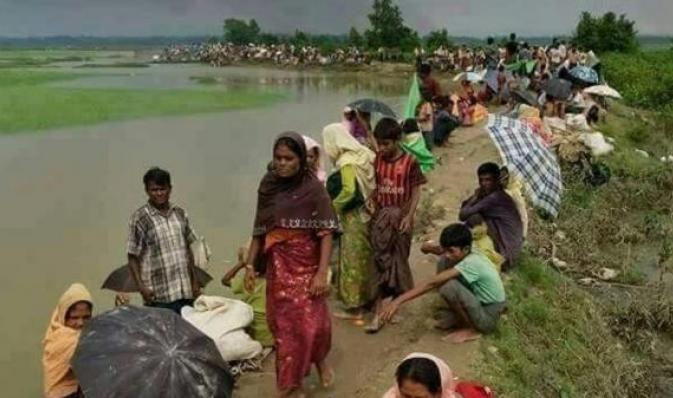
https://www.npr.org/2017/11/15/564443814/in-myanmar-the-persecution-of-t...
On Wednesday, Secretary of State Rex Tillerson met with senior government officials in Myanmar about the violent and ongoing persecution of the country's Rohingya minority, which has fueled a massive refugee exodus in recent months. NPR's Kelly McEvers speaks with Maung Zarni, fellow with the Cambodian Documentation Center, specializing in genocide in Buddhist countries, about how the Burmese justify their actions and what it would take to broker a resolution to the current crisis.
KELLY MCEVERS, HOST:
Secretary of State Rex Tillerson was in Myanmar today to urge the government there to stop the persecution of a Muslim minority called the Rohingya. Hundreds of thousands of Rohingya have fled Myanmar since August. They now live in squalid conditions across the border in Bangladesh. The U.N. has called the crisis a textbook example of ethnic cleansing. Rex Tillerson did not go that far. He said what happened, quote, "has a number of characteristics of crimes against humanity," and he called for an independent investigation.
To talk about this more, we're going to Maung Zarni. He is a fellow with the Cambodian Documentation Center, specializing in genocide in Buddhist countries. Welcome to the show.
MAUNG ZARNI: Thank you.
MCEVERS: Can you just take us back a little bit and help us understand why the Rohingya are persecuted in Myanmar?
ZARNI: Well, for two reasons. They are Muslims. And the other reason is because they are Muslim with their own claim on this strategic piece of borderland next to Bangladesh, the Burmese army starting in the 1960s perceive them as a threat to national security.
MCEVERS: Burma of course being the former name of Myanmar. Much of the violence in Myanmar against the Rohingya people has been carried out by the military. Human rights groups have documented mass rape. They say thousands of people have been killed. How does the military in Myanmar justify this violence to the people of the country?
ZARNI: Simply put, the military in Burma today uses what the Nazis used in the 1930s - that they have misframed the Rohingyas the way the Nazis blamed the Jewish people for everything that was wrong with the society, all the frustration and anger. So I think the military has cleverly diverted public frustration towards the Rohingya, who are completely unarmed and helpless. And they've been sitting ducks for the last 40 years.
MCEVERS: And human rights groups have said that Aung San Suu Kyi, the de facto leader of Myanmar, is part of the problem here. This is a woman who of course won the Nobel Peace Prize. She's considered a champion of human rights. Yet she will not say that what's happening to the Rohingya is ethnic cleansing. Why? Why is she not getting more involved in their case?
ZARNI: Well, you know, I've known her personally, and I've supported her for the first 15 years of my activism. And simply put, she is anti-Muslim races. She is Islamophobe. I mean, she is a big part of the problem.
MCEVERS: U.S. Secretary of State Rex Tillerson met with her today. We know that. I mean, is she part of the solution, or is it going to have to be someone else who could turn the tide here and change what's happening to these people?
ZARNI: Well, there is no someone else inside the country. Even Buddhist monks justify openly to the military, to the public that killing the nonbelievers, non-Buddhists, the Rohingyas does not amount to bad karma. It is not a crime. And the public is fully behind the army and Aung San Suu Kyi because they believe that those two entities are defending the nation.
MCEVERS: If she's not the person to solve this, what will solve this problem?
ZARNI: Well, the solution lies outside. And there has to be an international coalition outside the Security Council that is prepared to make a concerted effort to bear serious pressure on both Aung San Suu Kyi and the military.
MCEVERS: Do you think Secretary of State Rex Tillerson's visit will provide that outside pressure that you think is needed for things to change?
ZARNI: You know, yes or no. Yes, it would put the Burmese military on notice, but no because they have not put their foot down saying that this is international crime and you stop this immediately, or there will be consequences. So that message is not being delivered by Tillerson.
MCEVERS: Maung Zarni specializes in genocide in Buddhist countries. He joined us from the U.K. on Skype. Thank you so much.
ZARNI: Thank you.









